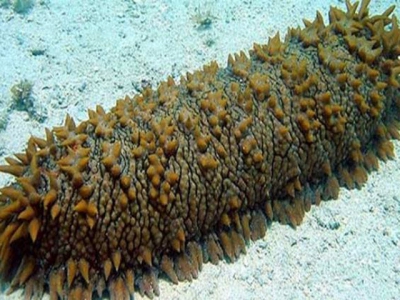Phú Yên to start the culture of commercial peanut worm

The Research Institute for Aquaculture no.3 (Ria3) has just succeeded in transferring the artificial reproduction technology of peanut worms in Phú Yên province and started to farm commercial peanut worms in Đông Hòa and Sông Cầu towns.
Successful artificial reproduction of peanut worms
Peanut worm, the so-called sea worm, is a high economic value species. Cleaned peanut worms are sold at 500,000-800,000 dong per kilogram while dried peanut worms are priced between three or four million dong per kilogram.
According to the Economic Office of Sông Cầu town, more than 1,000 farmers have been devoted to exploiting peanut worms since 2003, with about 5 kilograms of peanut worm being caught by each. However, over exploitation has led to a drastic reduction of natural peanut worms. There are so few natural peanut worms that only 1-2kg fresh peanut worms are exploited per day.
Deputy Head of the Economic Office of Sông Cầu town, Nguyễn Anh, said that the town experimented rearing peanut worms in giant tiger prawn ponds from 2015 to 2020. Peanut worm juveniles were bought from Khánh Hòa province and weighed up to 8.6g each after 8 months, bringing in an output of 1.37 tons/ha.
From the initial success that the trial growing model brought, the town planned to develop a suitable commercial growing model. However, as peanut worm juveniles were not commercially produced, local farmers could not start their plan.
Doctor Thái Ngọc Chiến, Director of the Research Division of Capture fisheries and Resources Management under Ria3 said that not only had the Institute been successful in studying some growing models, but they mastered technologies of juvenile production and peanut worm commercial culture.
Phú Yên province is implementing the project of applying the technology of juvenile production and peanut worm commercial culture for sustainability assurance. Ria3 has transferred the successful technology of juvenile production and plans to transfer the technology of commercial culture of peanut worms in association with white leg shrimp.
Implement commercial culture of peanut worms
The project of applying the technology of juvenile production and peanut worm commercial culture for sustainability assurance has been carried out since April 2021, with two phases. The first phase is to transfer the juvenile production technology to local farmers so that they can produce peanut worm juveniles themselves and develop peanut culture in Phú Yên.
The second phase is to implement the commercial culture of peanut worms in association of white leg shrimp farming so as to reuse the waste from the farming system, resulting in a sustainable white leg shrimp culture in Phú Yên.
Engineer Nguyễn Văn Cảnh of Ria3 said: “Some officers and I were sent to the broodstock production facility in Hòa Hiệp Trung ward of Đông Hòa town to produce and transfer the peanut worm production technology. The process of producing peanut juvenile is similar to the production of white leg shrimp, crab, and clam.
The commercial growing model of peanut worms and the co-culture of white leg shrimp with peanut worm will be carried out in Đông Hòa and Sông Cầu towns (in four different farming areas).
Đỗ Tấn Thành, an officer of the Economic Office in Đông Hòa town, said that peanut worm is a new species for farming and commercial culture would take 6-8 months.
The adult peanut worm are naturally exploited in Vạn Ninh and Cam Lâm of Khánh Hòa province. They are salt water peanut worms. As planned, around 600,000 peanut worm juveniles would be produced after three times of production from 2021 to 2022. Two times of production were successful with a total of 420,000 peanut worm juveniles, size 1.5-2cm, being produced from 1,000kg of adult peanut worm. All juveniles are qualified for commercial culture.
Doctor Thái Ngọc Chiến added that Ria3 had transferred technologies and many localities had succeeded in producing juvenile and commercially rearing peanut worms, bringing in tremendously high economic efficiency, especially in Khánh Hòa.
The model of growing white leg shrimp with peanut worms will bring great efficiency in economy and environment because peanut worm’s intake of organic waste at the bottom of the grow-out pond will reduce a large amount of organic waste, feces, and leftover feed.
Moreover, peanut worms are adaptive to the environment and salinity (20-28‰), live at the bottom and eat plankton and organic waste. These biological features enable them to be reared in white leg shrimp ponds.
Doctor Thái Ngọc Chiến said that commercial culture of peanut worm would bring farmers three benefits. The first one was that organic waste at the bottom of the grow-out pond would be consumed, eliminating the pollution and pathogens from the white leg shrimp farming.
The second one was that peanut worms consumed and changed low energy substances (waste) into useful and high energy elements (protein for peanut worms). The third one was that peanut worms would add up to the output of the whole farming system, raising income for farmers of white leg shrimp.
Related news
 Nine ways to produce more sustainable and affordable blue food - Part 1
Nine ways to produce more sustainable and affordable blue food - Part 1 Conversations around increasing aquatic food production too often focus on species, environments and ambitious hi-tech solutions that will benefit the privilege
 Nine ways to produce more sustainable and affordable blue food - Part 2
Nine ways to produce more sustainable and affordable blue food - Part 2 Traditionally, aquatic animal farming has been dominated by ponds, floating cages, fixed cages, and reservoirs for freshwater finfish and crustaceans
 Nine ways to produce more sustainable and affordable blue food - Part 3
Nine ways to produce more sustainable and affordable blue food - Part 3 Aquatic foods vary widely in terms of edible yields, nutritional content, processing techniques, distribution, consumption, and food loss and waste